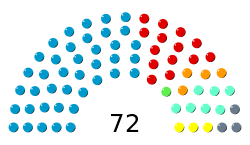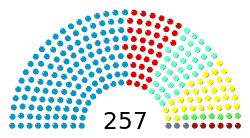National Congress of Argentina
| Argentine National Congress Congreso de la Nación Argentina | |
|---|---|
 | |
| Type | |
| Type | |
| Houses |
Senate Chamber of Deputies |
| Leadership | |
| Structure | |
| Seats |
329 72 Senators (List) 257 Deputies (List) |
 | |
 | |
| Elections | |
Senate last election | 25 October 2015 |
Chamber last election | 25 October 2015 |
| Meeting place | |
_(8081437098).jpg) | |
|
Argentine National Congress Palace Buenos Aires, Argentina | |
| Website | |
| Congreso de la Nación (Spanish) | |
The Congress of the Argentine Nation (Spanish: Congreso de la Nación Argentina) is the legislative branch of the government of Argentina. Its composition is bicameral, constituted by a 72-seat Senate and a 257-seat Chamber of Deputies.
The Congressional Palace is located in Buenos Aires, at the western end of Avenida de Mayo (at the other end of which is located the Casa Rosada). The Kilometre Zero for all Argentine National Highways is marked on a milestone at the Congressional Plaza, next to the building.
Attributes
The Argentine National Congress is bicameral, composed of the Senate and the Chamber of Deputies. The ordinary sessions span is from March 1 to November 30; the President of Argentina is entitled to convene extraordinary sessions during the recess, if needed.[1] Senators and deputies enjoy parliamentary immunity during their mandates, which may be revoked by their peers if a senator or deputy is caught in flagrante, in the midst of committing a crime.[2]
The Congress is in charge of setting taxes and customs, which must be uniform across the country.[3] It rules the Central Bank of Argentina,[4] manages internal and external debt payment,[5] and the value of national currency[6] (currently the Argentine peso). It rules the legal codes on Civil, Commercial, Penal, Minery, Work and Social Welfare affairs, all of which cannot be in contradiction with the respective provincial codes.[7] Any changes on national or provincial limits, or the creation of new provinces, ought to be allowed by the Congress.[8]
The Congress is entitled to approve or reject every international treaty that Argentina signs with other states or international organizations. When approved, the treaties acquire priority over ordinary legislation.[9] Declarations of war and the signing of peace,[10] as well as the mobilization of the national troops, within or without of the Argentine territory[11] must be allowed by the Congress.
History
From 1976 to 1983, the Congressional Palace of Argentina housed the CAL (Legislative Advisory Commission), a group of officers from the three Armed Forces. Commissioned to review and discuss laws before they were issued by the Executive Branch, they served a succession of de facto military presidents during the National Reorganization Process. In practice, this became a mechanism to detect and discuss the differences between the three commanders-in-chief of the Army, Navy, and Air Force regarding a specific project. The CAL was established by the Acta del Proceso de Reorganización Nacional (National Reorganization Process Act), the guiding document for the military government established after the coup d'état of March 24, 1976.
Following a 1994 reform of the Constitution, the Senate was expanded from 48 members (two per province or district) to 72 members, whereby the party garnering second place in elections for Senator would be assured the third seat for the corresponding province.
 |
| This article is part of a series on the politics and government of Argentina |
| Foreign relations |
See also
- Opening of regular sessions of the National Congress of Argentina
- Argentine National Congress Palace
- List of current Argentine Senators
- List of current Argentine Deputies
- Politics of Argentina
- List of legislatures by country
Bibliography
- "National Constitution of Argentina". Constitution of Argentina (in Spanish).
References
- ↑ Argentine Constitution, art. 63
- ↑ Argentine Constitution, art. 69
- ↑ Argentine Constitution, art. 75, i. 1, 2 and 3
- ↑ Argentine Constitution, art. 75, i.6
- ↑ Argentine Constitution, art. 75, i.7
- ↑ Argentine Constitution, art. 75, i.11
- ↑ Argentine Constitution, art. 75, i.12
- ↑ Argentine Constitution, art. 75, i.15
- ↑ Argentine Constitution, art. 75, i.22
- ↑ Argentine Constitution, art. 75, i.25
- ↑ Argentine Constitution, art. 75, i.28
External links
| Wikimedia Commons has media related to Congress Palace (Buenos Aires). |
Coordinates: 34°36′34.75″S 58°23′33.29″W / 34.6096528°S 58.3925806°W
.svg.png)